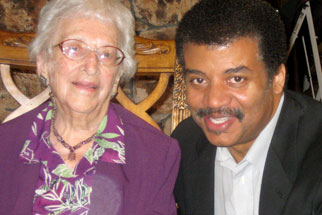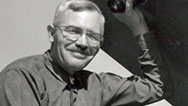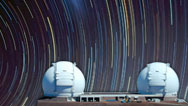Notes From the Pluto Files
- By David Levin
- Posted 01.01.10
- NOVA
To make their program "The Pluto Files," Neil deGrasse Tyson and NOVA producer Terri Randall took a trip from Boston to California, tracing the history of Pluto. Along the way, they met the family of Clyde Tombaugh, the man who discovered Pluto in 1930. In this podcast, Neil talks to Terri about their experience.
 Listen
Listen
Neil deGrasse Tyson describes what it was like to meet Clyde Tombaugh's family and other people passionate about Pluto.
Transcript
Notes From the Pluto Files
Posted January 1, 2010
DAVID LEVIN: You're listening to a NOVA podcast. I'm David Levin.
In 2006 an international gathering of astrophysicists declared that Pluto would no longer be called a planet. Neil deGrasse Tyson had no problem with the choice. As director of the Hayden Planetarium in New York, he'd already overseen an exhibit lots of people felt demoted Pluto, causing a public uproar in the process.
But why has a distant icy rock been the center of such controversy? To find out, Neil and NOVA producer Terri Randall took a trip from Boston to California, tracing the history of Pluto. Along the way, they stopped in New Mexico to interview the family of Clyde Tombaugh, the man who discovered Pluto in 1930.
In this podcast, Neil talks to Terri about their experience.
TERRI RANDALL: We never really got a chance to talk about your reaction to the trip cross country.
NEIL deGRASSE TYSON: No, we didn't.
TERRI RANDALL: And I was wondering, what was it like to meet the Tombaugh family?
NEIL deGRASSE TYSON: I didn't know what to expect, and I have to tell you, that has got to be the friendliest family I have ever spent time with in my life. They were gracious, and plus, as you know, we just took over their home with cameras and lights and—but they served us food. They were just so friendly. And I'm thinking, you know, maybe I spend too much time in New York, or something. Are people really like this when you go elsewhere?
And having a full conversation with Clyde's 97-year-old widow who spoke lucidly and articulately about their life together when Clyde was younger and their later years. This is a treasure of storytelling that you don't always have the privilege of obtaining, not only just in your life, but especially not if you're trying to even make a film. You know, it's hard to get that. And that was all there, wound up in one encounter with the Tombaugh family.
And another thing I didn't quite know what to expect is when his daughter Annette—we agreed to sort of fly her into New York to have her look at the place, and here she comes. And we sort of bring her in the back door, right? And I show her—I don't know what she's going to say. And she was actually—I don't know if she was just being friendly, gracious because that's her nature, or whether she was actually pretty much okay with our treatment of Pluto. I think she had believed in the stereotyped accounts of what we had done, like we had somehow kicked Pluto out of the solar system. I think she might have expected a sign that said "Pluto's too small to make it in New York," you know.
And that's not what she found, of course. She found that we put Pluto with the Kuiper Belt in the exhibit where we talk about the structure of the solar system, and she expressed in the film she was fine with that. But, although my favorite comment was "Well, I wish it was a little bigger." [Laughs]
TERRI RANDALL: And a little higher.
NEIL deGRASSE TYSON: And a little higher. But so the whole journey, as exhausting as it was, was worth every moment that we spent. And—
TERRI RANDALL: Did you learn anything on the trip?
NEIL deGRASSE TYSON: I learned how friendly people can be, even in times of intellectual conflict. That was encouraging. I learned the depth of passion people can have, be they scientists or laymen, for something they care about scientifically.
I think we—all too often we tell ourselves that if it's science, it has to be cold and dispassionate, and that's not really true. Pluto happened to ruffle more feathers than what is typical for a scientific subject, but I think we captured, cinematically, the emotions that drive the statements made by the scientists we interviewed.
So it's not just, you know, common folk on the street, it's scientists as well, who feel strongly about something and want to argue their case. And that's what any of us want to do when we feel—when we're driven by feelings, and I think there are times when feelings are good. It reminds you of what it is to be alive with emotion.
TERRI RANDALL: So the debate that's still going on over Pluto among your colleagues. Why is it still such a heated subject?
NEIL deGRASSE TYSON: I think the word planet has had such a legacy, it's had such a significance to our understanding of what's in our backyard here on spaceship Earth, that if something was once a planet and then isn't, that it affects you emotionally. You don't want it to be less than what it had been considered before. And so you garner your thoughts, your arguments, your—and here, the interesting thing about science is that if there's insufficient data or the data are not good enough, there will always be debates. Debates stop when the data finally rolls in, and when it rolls in and everyone looks at it and says, there you go. We're done. Let's go on to the next problem. We shake hands and move on.
And that's not really happened yet with regard to Pluto. What we do know about it has forced people to choose up sides. What we will yet discover about it may resolve that without question. It may be that this concept of planet is just outdated. We're arguing over something that shouldn't even be argued about. We should be using that same intellectual energy to invent a whole new lexicon to account for what orbits a star.
In fact, that's really where I would—if I were to vote on where this should go, that's the direction I think it should take. Let's reinvent a way to talk about the solar system with the benefit of what we have learned about what's going on out there over the past 20 years.
Credits
Audio
- Produced by
- David Levin
- Interview by
- Terri Randall
Image
- (Patsy Tombaugh and Neil deGrasse Tyson)
- © Michael Reichman/WGBH Educational Foundation
Related Links
-

The Pluto Files
Take a cross-country journey with Neil deGrasse Tyson to explore the rise and fall of America's favorite planet.
-

My Dad Discovered Pluto
How did Clyde Tombaugh go from baling hay to finding Pluto? See family photos and hear his son Alden reflect.
-

Hunting the Edge of Space: Hr 1
The Mystery of the Milky Way: From Galileo's to today's, telescopes have opened grand vistas onto our galaxy and beyond.
You need the Flash Player plug-in to view this content.

